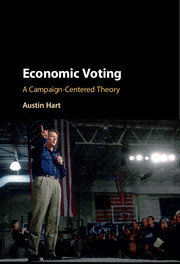Book contents
- Frontmatter
- Dedication
- Contents
- List of Figures
- List of Tables
- Acknowledgments
- 1 The Economic Voting Puzzle
- 2 A Campaign-Centered Theory of Economic Voting
- 3 Can Ads Prime the Economy? How Would We Know? US 1992
- 4 The Impact of a Surge in Economic Messages: Mexico 2006
- 5 The Absent Economic Message: US and Mexico 2000
- 6 The Campaign-Centered Model in Comparative Perspective
- 7 Conclusion
- Appendix
- References
- Index
2 - A Campaign-Centered Theory of Economic Voting
Published online by Cambridge University Press: 05 September 2016
- Frontmatter
- Dedication
- Contents
- List of Figures
- List of Tables
- Acknowledgments
- 1 The Economic Voting Puzzle
- 2 A Campaign-Centered Theory of Economic Voting
- 3 Can Ads Prime the Economy? How Would We Know? US 1992
- 4 The Impact of a Surge in Economic Messages: Mexico 2006
- 5 The Absent Economic Message: US and Mexico 2000
- 6 The Campaign-Centered Model in Comparative Perspective
- 7 Conclusion
- Appendix
- References
- Index
Summary
A top McCain adviser signaled last week that the campaign intends to “turn the page” from economic issues – which polls show have staked Obama to a significant lead – and ramp up attacks on Obama as an inexperienced ultraliberal. “It's a dangerous road, but we have no choice,” a top McCain strategist told the Daily News. “If we keep talking about the economic crisis, we're going to lose.”
– New York Daily News, October 5, 2008Events, over which government may, or more likely may not, have control, shape the attitudes of voters to the advantage or disadvantage of the party in power. By the time the presidential campaign rolls around the die may have been cast.
– V.O. Key, 1966Existing economic voting theory is insufficient as a model of both individual-level voting behavior and aggregate-level electoral outcomes, so this chapter proposes a more persuasive account by drawing on cognitive-psychological theories of decision-making. In particular, I build on priming theory (e.g. Iyengar & Kinder 1987) to formulate a new psychology of economic voting that highlights the power of economic campaign messages to condition the strength of the economic vote. Unlike the ideal-typical assumptions that motivate the conventional economic voting model and the clarity of responsibility thesis, this psychological argument is built inductively on well-documented patterns of human behavior. Rather than assert that citizens are instrumentally rational actors who intend to behave as economic voters, priming theory provides a strong microfoundational basis for understanding why and to what extent voters turn to their economic opinions when casting a ballot. By reevaluating the psychology of economic voting in light of extensive research on priming, I also provide a systematic account of the influence of campaign strategy on individual-level political behavior, which extant theory treats only in an ad hoc fashion. As a result, a campaign-centered theory rooted in the priming approach provides robust theoretical grounds for understanding the interactions between economic performance, political campaigns, and electoral outcomes.
Psychological theories of decision-making necessarily elevate the power of individual action over structural and institutional factors. Despite this methodological individualism, the argument I develop in this chapter is not that economic structure has no influence on electoral outcomes.
- Type
- Chapter
- Information
- Economic VotingA Campaign-Centered Theory, pp. 28 - 50Publisher: Cambridge University PressPrint publication year: 2016

